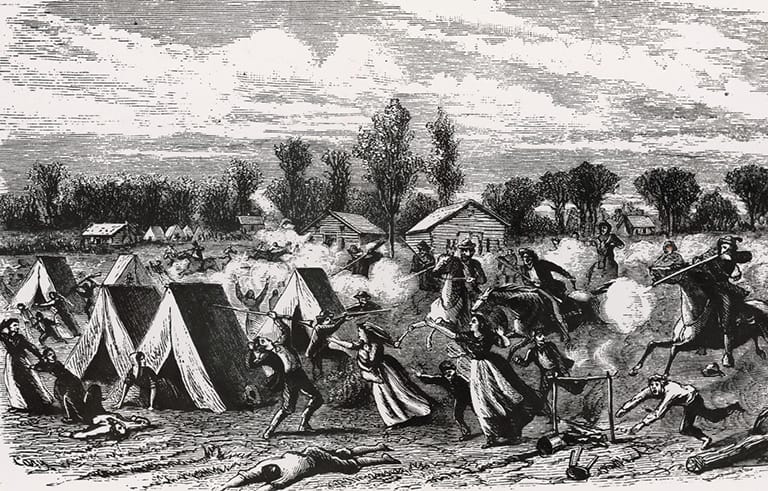Religion Professor Signs Court Brief Questioning Muslim Ban

The federal government considered Mormons so dangerous during the late 19th century that Rutherford B. Hayes’s administration urged the governments of Europe to prevent members of that religious group from entering the United States.
In the 21st century, Donald Trump’s administration considers Muslims such a “dangerous threat” that they are seeking to prevent individuals from several Muslim countries from entering the United States.
While more than a century separates these events, the similarities are so striking that Claremont Graduate University’s Patrick Mason joined other scholars seeking to influence a federal court expected to issue a ruling over President Trump’s “Muslim ban.” Mason, who holds the Howard W. Hunter Chair of Mormon Studies at CGU, says the country’s history of discrimination and violence against members of the Church of Jesus Christ of Latter-day Saints offers a cautionary tale at a time when the legitimacy of government action targeting a particular religion is being considered.
“I don’t think any reasonable American would be proud of how the nation treated its Mormon minority in the 19th century, and I for one want us to pause before pursuing policies that our grandchildren will judge us unkindly for in regard to our treatment of religious minorities in the 21st century,” said Mason, who also serves as dean of the School of Arts & Humanities.
Mason is one of 19 scholars of Mormon history who filed a “friend of the court” brief this month in the Ninth Circuit Court of Appeals. The court next month will hear arguments for and against Trump’s current executive order suspending the admission of refugees and immigrants from Iran, Libya, Somalia, Sudan, Syria, and Yemen.
The scholars point to historic instances of government action that targeted Mormons.
Mormons were driven from their homes and communities in multiple states, prompting Brigham Young to lead a move to Utah—then a part of Mexican territory—because they believed the United States would not protect them as a minority, said Mason, the author of The Mormon Menace: Violence and Anti-Mormonism in the Postbellum South. In 1838, Missouri Governor Lilburn Boggs issued an executive order requiring Mormons to leave the state or be “exterminated.” Joseph Smith, the religion’s founding prophet, was murdered by an armed mob in 1844.
“All Americans, regardless of their religious or political orientation, should be troubled by the treatment of Latter-day Saints in the 19th century,” Mason said.
From the 1860s through the 1880s, all three branches of the federal government pursued a systematic set of policies meant to curb Mormon power that eventually led to the seizure of the church’s temples and other major assets, Mason said. In 1879, Hayes recommended to Congress that Mormons might be stripped of the “rights and privileges of citizenship.” That same year, Secretary of State William Evarts asked several European governments to prevent Mormons from emigrating to the United States.
“It was a clear example of the federal government seeking to restrict the immigration of a specific religious group that it deemed undesirable and dangerous,” said Mason, who has written extensively about Mormonism, American religious history, and religion, violence, and peacebuilding.
Mason said a scholarly understanding about Mormon history can inform the current national and international conversation about the current administration’s efforts to single out immigrants from certain Muslim-majority countries.
In January, Trump issued an order temporarily banning individuals from seven countries with largely Muslim populations. The order, which triggered a series of protests across the country, was blocked by a federal appeals court. A new, revised order was also blocked by a judge. Judges say the ban violates individuals’ First Amendment rights and the Establishment Clause, which prohibits the government from making laws targeting a specific religion.
The court brief has been covered this month by numerous media outlets, including the Washington Post and CNN.
Other scholars who signed the brief include Richard Bushman, a professor emeritus of American history at Columbia University and former CGU faculty; Nathan Oman, a professor of law at William & Mary Law School; and Laurel Thatcher Ulrich, a Pulitzer Prize-winning history professor at Harvard University.
“We’re under no delusion that our brief will be the decisive factor in the court’s decision or the administration’s rethinking of its own policies,” Mason said, “but we do want to make the courts, policymakers, and general public aware that there is a historical precedent that we can look back on. Perhaps this lesson from history will at least give us pause in the current context before we move forward with policies that target a particular unpopular religious minority.”